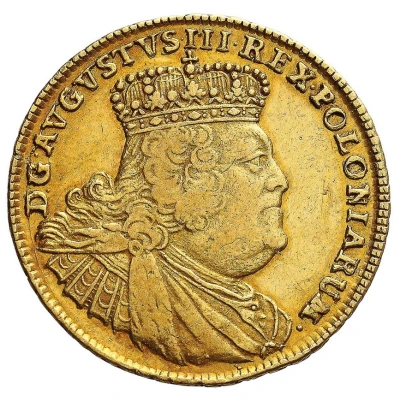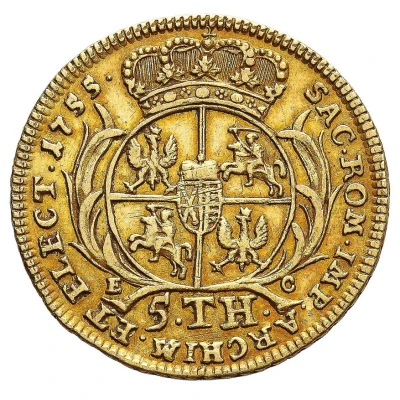


© Antykwariat Numizmatyczny - Michał Niemczyk
Augustdor koronny - August III Sas Lipsk
| Gold | 6.62 g | 23 mm |
| Issuer | Polish–Lithuanian Commonwealth |
|---|---|
| King | Augustus III (1734-1763) |
| Type | Standard circulation coin |
| Years | 1753-1758 |
| Value | 5 Thalers (Pięciotalar) (40) |
| Currency | First Zloty (1573-1795) |
| Composition | Gold |
| Weight | 6.62 g |
| Diameter | 23 mm |
| Shape | Round |
| Demonetized | Yes |
| Updated | 2024-10-07 |
| Numista | N#125759 |
|---|---|
| Rarity index | 97% |
Reverse
Script: Latin
Lettering:
SAC ROM IMP ARCHIM ET ELECT 1755
E-C
5 TH
Comment
Kopicki 2149 1753Kopicki 2150 1754
Kopicki 2151
D G AVGVSTVS III REX POLONIARUM
SAC ROM IMP ARCHIM ET ELECT 1755
Price: 9 000 PLN
Picture: © ANMN
Kopicki 2151; Kahnt 669; H-Cz. 2891; Kaleniecki s. 502; Parchimowicz 1326 b
--------------------------------------------------------------------------------------------------------------------------------------------------------------------------------------------------------
EFRAIMEK - fake coin
Veitel Heine Ephraim (1703 – 16 May 1775 in Berlin) Jew jeweller in the Prussian Court, an entrepreneur in Potsdam and since 1756 Prussian Mint Master under Frederick the Great. He and his companion Daniel Itzig became infamous for debasing the Polish - Saxonian currency, adding copper, up to 70%, into the fake coins (Ephraimiten). Each year they paid Frederick the Great seignorage, ableing him to finance the Seven Years' War.
Efraimek of Kopicki 2151
D G AVGVSTVS III REX POLONIARUM
SAC ROM IMP ARCHIM ET ELECT 1755
Price: 4 000 PLN
Picture: © ANMN
Kopicki 2152
Punch 1:
D G AVGVSTVS III REX POLONIARUM
SAC ROM IMP ARCHIM ET ELECT 1756
Price: 5 500 PLN
Picture: © Antykwariat Numizmatyczny - Michał Niemczyk
Punch 2:
D G AVGVSTVS III REX POLONIARUM
SAC ROM IMP ARCHIM ET ELECT 1756
Price: 26 000 PLN
Picture: © Antykwariat Numizmatyczny - Michał Niemczyk
--------------------------------------------------------------------------------------------------------------------------------------------------------------------------------------------------------
EFRAIMEK - fake coin
Veitel Heine Ephraim (1703 – 16 May 1775 in Berlin) Jew jeweller in the Prussian Court, an entrepreneur in Potsdam and since 1756 Prussian Mint Master under Frederick the Great. He and his companion Daniel Itzig became infamous for debasing the Polish - Saxonian currency, adding copper, up to 70%, into the fake coins (Ephraimiten). Each year they paid Frederick the Great seignorage, ableing him to finance the Seven Years' War.
Efraimek of Kopicki 2152
-------------------------------------------------------------------------------------------------------------------------------------------------------------------------------------------------------
Kopicki 2153 1758
--------------------------------------------------------------------------------------------------------------------------------------------------------------------------------------------------------
EFRAIMEK - fake coin
Veitel Heine Ephraim (1703 – 16 May 1775 in Berlin) Jew jeweller in the Prussian Court, an entrepreneur in Potsdam and since 1756 Prussian Mint Master under Frederick the Great. He and his companion Daniel Itzig became infamous for debasing the Polish - Saxonian currency, adding copper, up to 70%, into the fake coins (Ephraimiten). Each year they paid Frederick the Great seignorage, ableing him to finance the Seven Years' War.
Efraimek of Kopicki 2153
Punch 1:
D G AVGVSTVS III REX POLONIARUM
SAC ROM IMP ARCHIM ET ELECT 1758
Price: 11 000 PLN
Picture: © ANMN
Interesting fact
The Augustdor koronny coin, minted during the reign of August III Sas (Lipsk) in the Polish-Lithuanian Commonwealth (1753-1758), is an interesting piece of history. One fascinating fact about this coin is that it was made of gold, specifically 6.62 grams of it, which was a significant amount for a circulating coin at that time. This coin's value was not only in its monetary worth but also in its symbolism, as gold was associated with wealth, power, and prestige. The fact that it was used to create a circulating coin speaks to the wealth and prosperity of the Polish-Lithuanian Commonwealth during that period.